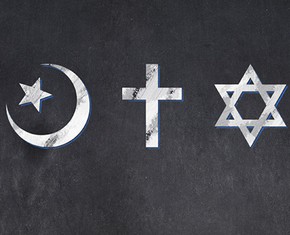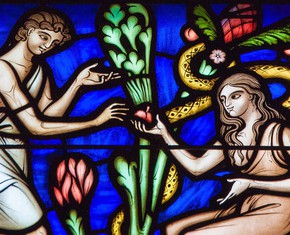The views expressed in our content reflect individual perspectives and do not represent the authoritative views of the Baha'i Faith.
Have you ever encountered someone eager to tell you about their religion—but who doesn’t harbor a hidden or expressed interest in converting you?
Almost all of us have had experiences where someone has approached us with a declared or concealed hope that we will accept, convert to or declare the belief they hold. More often than not, the person hoping to change someone else’s religious identity is convinced that what you call yourself is of the utmost importance for your spiritual well-being and your eternal life.
But does what you call yourself really matter?
That’s an important question, and the Baha’i teachings provide some interesting points to consider.
First, Baha’is believe that the prophets and founders of the world’s great religions—the manifestations of God, in Baha’i terminology—did not appear just so a certain number of people would recognize them:
The holy, divine Manifestations did not reveal themselves for the purpose of founding a nation, sect or faction. They did not appear in order that a certain number might acknowledge their prophethood. They did not declare their heavenly mission and message in order to lay the foundation for a religious belief. Even His Holiness Christ did not become manifest that we should merely believe in him as the Christ, follow him and adore his mention. – Abdu’l-Baha, The Promulgation of Universal Peace, p. 442.
Abdu’l-Baha continued by explaining that the common purpose of the messengers of God involves uniting hearts, enkindling the light of love, and creating unity and fellowship among a diverse and divided humanity:
Nay, rather His Holiness Christ appeared in order to illumine the world of humanity, to render the earthly world celestial, to make the human kingdom a realm of angels, to unite the hearts, to enkindle the light of love in human souls, so that such souls might become independent, attaining complete unity and fellowship, turning to God, entering into the divine Kingdom, receiving the bounties and bestowals of God and partaking of the manna from heaven. – Ibid., p. 443.
In addition, the Baha’i teachings indicate that the names and labels we use as followers of these manifestations of God don’t hold any significance beyond this earthly life. Referring to the names of the major messengers of God–Moses, Buddha, Christ, Muhammad, Baha’u’llah, etc.–the Baha’i teachings explain that the distinction of their names fades into non-existence in the realm of God, where their reality reflects oneness and unity:
And wert thou to soar in the holy realm of “God was alone, there was none else besides Him,” thou wilt find in that Court all these names utterly non-existent and completely forgotten. – Baha’u’llah, The Book of Certitude, p. 163.
If the names of the manifestations of God are non-existent and forgotten in God’s realm, then we can reasonably conclude that the mere names and labels we use as their followers here on Earth—whether we call ourselves a Jew, a Buddhist, a Christian, a Muslim, a Baha’i etc.—likewise don’t have any existence or importance there.
If these names and labels don’t have any importance there, then perhaps we should consider the purpose of these names and labels in this life, and why we often care so much about how someone identifies their beliefs, and identifies themselves in those terms. This doesn’t necessarily mean that these names and labels don’t have any importance whatsoever here, but for such a name to have importance, the Baha’i teachings tell us that it must yield the fruit of human virtues:
“Baha’i” is not just a name but a truth. Every child must be trained in the things of the spirit, so that he may embody all the virtues and become a source of glory to the Cause of God. Otherwise, the mere word “Baha’i”, if it yield no fruit, will come to nothing. – Abdu’l-Baha, Selections from the Writings of Abdu’l-Baha, p. 143.
Furthermore, those who are considered followers of the Manifestation of God include those who exemplify the teachings of the Manifestation, regardless of what they call themselves:
Charity is pleasing and praiseworthy in the sight of God and is regarded as a prince among goodly deeds. Consider ye and call to mind that which the All-Merciful hath revealed in the Qur’an: ‘They prefer them before themselves, though poverty be their own lot. And with such as are preserved from their own covetousness shall it be well.’ Viewed in this light, the blessed utterance above is, in truth, the day-star of utterances. Blessed is he who preferreth his brother before himself. Verily, such a man is reckoned, by virtue of the Will of God, the All-Knowing, the All-Wise, with the people of Baha who dwell in the Crimson Ark. – Baha’u’llah, Tablets of Baha’u’llah, p. 71.
“The Crimson Ark” is a phrase that refers to the Cause of Baha’u’llah, and in Baha’u’llah’s writings his followers are designated as the “companions of the Crimson Ark.” This passage indicates that people who selflessly prefer others to themselves are considered Baha’is. Moreover, it doesn’t matter whether or not someone has ever heard of the manifestation of God to be considered a follower. At the same time, merely calling oneself a follower isn’t sufficient; the life one lives matters most:
It makes no difference whether you have ever heard of Baha’u’llah or not, the man who lives the life according to the teachings of Baha’u’llah is already a Baha’i. On the other hand a man may call himself a Baha’i for fifty years and if he does not live the life he is not a Baha’i. – Abdu’l-Baha, Abdu’l-Baha in London, p. 105-106.
















Comments
Sign in or create an account
Continue with Googleor